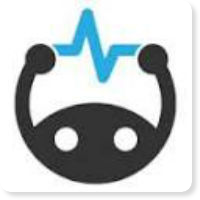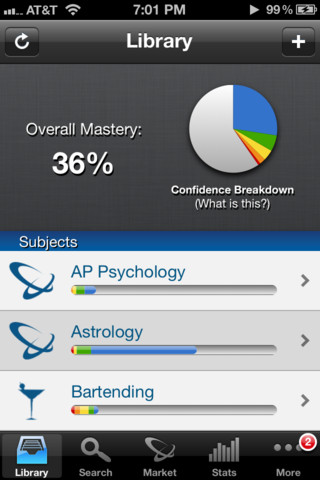DailyBean
LQ: 9.6
Recommended Age: 4+
Skills Used: Self-Awareness, Self-Control, Reading, Writing

Brainscape is a brain training app that focuses on the science of repetition. With an extensive library of flashcards ranging from languages and vocabulary to history and mythology, Brainscape offers a of variety of study options for students, teachers, or the casual learner. Operating on the concept of “confidence based repetition,” Brainscape asks users to rate their own mastery on a 1 to 5 scale. Users who are perfectly confident in a particular term are encouraged to give themselves a 5. Usually when users attribute the number 5 to a term, it will be shown very infrequently in the deck. The app then uses a percentage to show users how close they are to mastering all the terms and subject matter in any given deck of flashcards. Brainscape is a higher level learning app, and we recommend it for users who are 12 and older.
Recalling and retaining information in our mind while working.
![]() Brainscape works to stretch the capacity of the working memory through well-timed repetition. The working memory thinking skill, which is primarily concerned with appropriately recalling useful information, is put to the test by Brainscape's memory drills. Once users choose a deck, the flashcard testing begins. Users are encouraged to ruminate over the given word, phrase, term, or definition for a short period of time. After providing an answer either out loud or silently, users click to reveal an answer. Then users pick a number 1-5 which represents how well they understood the vocabulary. Brainscape's algorithm will then repeat that flashcard at an interval based on the numerical rating.
Brainscape works to stretch the capacity of the working memory through well-timed repetition. The working memory thinking skill, which is primarily concerned with appropriately recalling useful information, is put to the test by Brainscape's memory drills. Once users choose a deck, the flashcard testing begins. Users are encouraged to ruminate over the given word, phrase, term, or definition for a short period of time. After providing an answer either out loud or silently, users click to reveal an answer. Then users pick a number 1-5 which represents how well they understood the vocabulary. Brainscape's algorithm will then repeat that flashcard at an interval based on the numerical rating.
Understanding and articulating her own thoughts and feelings.
 During Brainscape study users engage in metacognition. Metacognition, or the way in which an individual thinks about their own thought process is an important step to become a better learner. And Brainscape works to make users more self-aware learners who can be honest about their own abilities. Through the app's "confidence based repetition" self-rating system, users are able to track their learning pace. Before flipping a flashcard to reveal the answer, users are asked to rank their level of mastery on a 1-5 scale. After a few plays, it's important that users check their "deck stats." The deck stats give a percentage of cards shown, the number of cards in the deck, and the user's level of mastery. Here users can track their progress and delve further into topics they have not mastered.
During Brainscape study users engage in metacognition. Metacognition, or the way in which an individual thinks about their own thought process is an important step to become a better learner. And Brainscape works to make users more self-aware learners who can be honest about their own abilities. Through the app's "confidence based repetition" self-rating system, users are able to track their learning pace. Before flipping a flashcard to reveal the answer, users are asked to rank their level of mastery on a 1-5 scale. After a few plays, it's important that users check their "deck stats." The deck stats give a percentage of cards shown, the number of cards in the deck, and the user's level of mastery. Here users can track their progress and delve further into topics they have not mastered.
While there are individual decks for a few historical topics and a handful of categories related to the maths and sciences, the majority of decks focus on the language arts - reading, in particular. The definitions on the flip side of the flashcard are often dictionary definitions. Or at least worded as such. The words and terms themselves are the type of vocabulary one would find on an SAT prep guide and require higher level reading skills. Learning new words, idiomatic phrases, scientific vocabulary, and historical figures and events will help users become more competent readers.
All membership plans come with full access to our entire suite of tools learning guides, and resources. Here are a few of the ones we think you’ll like the most: